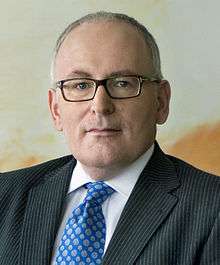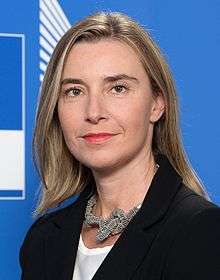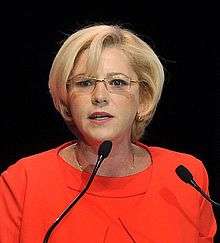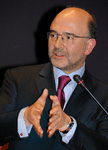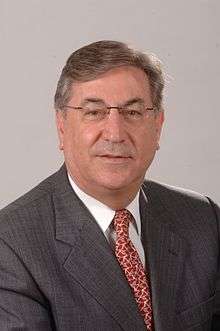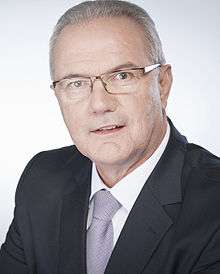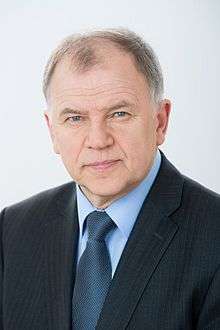Party of European Socialists
Party of European Socialists | |
|---|---|
 | |
| President | Sergei Stanishev (BG) |
| Secretary-General | Achim Post (DE) |
| Founded |
1973 (Confederation) 9–10 November 1992 (Party) |
| Headquarters | Rue Guimard 10, 1040 Brussels, Belgium |
| Think tank | Foundation for European Progressive Studies |
| Youth wing | Young European Socialists |
| Women's wing | PES Women |
| Ideology |
Social democracy[1][2] Pro-Europeanism |
| Political position | Centre-left[2] |
| International affiliation |
Progressive Alliance[3] Socialist International[4] |
| European Parliament group | Progressive Alliance of Socialists and Democrats |
| Colours | Red |
| European Parliament |
191 / 751 |
| European Council |
5 / 28 |
| European Commission |
8 / 28 |
| European Lower Houses |
2,327 / 9,874 |
| European Upper Houses |
645 / 2,714 |
| Website | |
| www.pes.eu | |
The Party of European Socialists (PES) is a social-democratic European political party.[5]
The PES comprises national-level political parties from all member states of the European Union (EU) plus Norway. This includes major parties such as the Italian Democratic Party, the British Labour Party, the French Socialist Party, Social Democratic Party of Germany and the Spanish Socialist Workers' Party. Parties from a number of other European countries are also admitted to the PES as associate or observer parties.[6] Most member, associate and observer parties are members of the wider Progressive Alliance or Socialist International.[3][4]
The PES is currently led by its president Sergei Stanishev, a former Prime Minister of Bulgaria. Its political group in the European Parliament is the Progressive Alliance of Socialists and Democrats (S&D). The PES also operates in the Committee of the Regions (in the PES Group in the Committee of the Regions) and the European Council.
Name
The party's English name is "Party of European Socialists". In addition, the following names are used in other languages:
- Albanian: Partia e Socialistëve Europianë
- Bosnian: Partija evropskih socijalista/Партија европских социјалиста
- Bulgarian: Партия на европейските социалисти
- Croatian: Stranka europskih socijalista
- Czech: Strana evropských socialistů
- Danish: De Europæiske Socialdemokrater
- Dutch: Partij van de Europese Sociaaldemocraten
- Estonian: Euroopa Sotsialistlik Partei
- Finnish: Euroopan sosialidemokraattinen puolue
- French: Parti socialiste européen
- German: Sozialdemokratische Partei Europas
- Greek: Ευρωπαϊκό Σοσιαλιστικό Κόμμα
- Hungarian: Európai Szocialisták Pártja
- Icelandic: Flokkur evrópskra sósíalista
- Irish: Páirtí na Sóisialaithe Eorpach
- Italian: Partito del Socialismo Europeo
- Maltese: Partit tas-Soċjalisti Ewropej
- Latvian: Eiropas Sociāldemokrātiskā partija
- Lithuanian: Europos socialistų partija
- Macedonian: Партија на европските социјалисти
- Norwegian: Det europeiske sosialdemokratiske partiet
- Polish: Partia Europejskich Socjalistów
- Portuguese: Partido Socialista Europeu
- Romanian: Partidul Socialiștilor Europeni
- Serbian: Партија европских социјалиста
- Slovak: Strana európskych socialistov
- Slovene: Stranka evropskih socialistov
- Spanish: Partido Socialista Europeo
- Swedish: Europeiska socialdemokraters parti
In March 2014 following the congress in Rome, the PES added the tagline "Socialists and Democrats" to its name following the admission of Italy's Democratic Party into the organisation.[7]
History
1960s
In 1961, the Socialists in the European Parliament attempted to produce a common 'European Socialist Programme' but this was neglected due to the applications of Britain, Denmark, Ireland and Norway to join the European Community. The Socialists' 1962 congress pushed for greater democratisation and powers for Parliament, though it was only in 1969 that this possibility was examined by the member states.[8]
1970s
In 1973, Denmark, Ireland and the United Kingdom joined the European Community, bringing in new parties from these countries. The enlarged Socialist Congress met in Bonn and inaugurated the Confederation of the Socialist Parties of the European Community. The Congress also passed a resolution on social policy, including the right to decent work, social security, democracy and equality in the European economy.[9] In 1978, the Confederation of Socialist Parties approved the first common European election Manifesto. It focused on several goals among which the most important were to ensure a right to decent work, fight pollution, end discrimination, protect the consumer and promote peace, human rights and civil liberties.
1980s
At its Luxembourg Congress in 1980, the Confederation of Socialist Parties approved its first Statute. The accession of Greece to the EU in 1981, followed by Spain and Portugal in 1986, brought in more parties.
In 1984, a common Socialist election manifesto proposed a socialist remedy for the economic crisis of the time by establishing a link between industrial production, protection of fundamental social benefits, and the fight for an improved quality of life.[9]
1990s
In 1992, with the European Community becoming the European Union and with the Treaty of Maastricht establishing the framework for political parties at a European level, the Confederation of Socialist Parties voted to transform itself into the Party of European Socialists. The party's first programme concentrated on job creation, democracy, gender equality, environmental and consumer protection, peace and security, regulation of immigration, discouragement of racism and fighting organised crime.[9]
Along with the Socialist Group in the European Parliament, the founding members of the PES were:[10]
- Social Democratic Party of Austria
- Socialist Party (Francophone) and the Socialist Party (Flemish) of Belgium
- Social Democrats of Denmark
- Socialist Party of France
- Social Democratic Party of Germany
- Panhellenic Socialist Movement of Greece
- Labour Party of Ireland
- Italian Democratic Socialist Party, Italian Socialist Party and Democratic Party of the Left of Italy
- Luxembourg Socialist Workers' Party
- Labour Party of the Netherlands
- Socialist Party of Portugal
- Spanish Socialist Workers' Party
- Swedish Social Democratic Party
- Labour Party and Social Democratic and Labour Party of the UK
2000s
In 2004 Poul Nyrup Rasmussen defeated Giuliano Amato to be elected President of the PES, succeeding Robin Cook in the post. He was re-elected for a further 2.5 years at the PES Congress in Porto on 8 December 2006 and again at the Prague Congress in 2009.
2010s
In 2010, the Foundation for European Progressive Studies was founded as the political foundation (think tank) of the PES.
Mr Rasmussen stood down at the PES Progressive Convention in Brussels on 24 November 2011. He was replaced as interim president by Sergei Stanishev, chairman of the Bulgarian Socialist Party (BSP) and former prime minister of Bulgaria.
On 28-29 September 2012, the PES Congress in Brussels[11] Congress elected interim president Sergei Stanishev as full President, as well as four deputies: Jean-Christophe Cambadélis (1st Vice-President – PS), Elena Valenciano (PSOE), Jan Royall (Labour) and Katarína Neveďalová (Smer-SD). The same Congress elected Achim Post (SPD) as its new secretary general, and adopted a process which it described as "democratic and transparent" for electing its next candidate for Commission President in 2014.[12] The PES had already agreed in 2011 to use a PES presidential primary for the election.
Organisation
| Social democracy |
|---|
 |
|
People
|
|
Member parties
The PES has thirty-four full member parties from each of the twenty-eight EU member states and Norway. There are a further thirteen associate and twelve observer parties from other European countries.[13]
Constituent organisations
The youth organisation of the PES is the Young European Socialists. PES Women is the party's women's organisation, led by Zita Gurmai. The LGBTI campaign organisation is Rainbow Rose.[14]
International memberships
PES is an associated organisation of Socialist International and the Progressive Alliance.
President and Presidency
The President (currently former Prime Minister of Bulgaria Sergei Stanishev) represents the party on a daily basis and chairs the Presidency, which also consists of the Secretary General, President of the S&D group in Parliament and one representative per full/associate member party and organisation. They may also be joined by the President of the European Parliament (if a PES member), a PES European Commissioner and a representative from associate parties and organisations.[14]
The list below shows PES Presidents and the presidents of its predecessors.[15]
| President | State | National party | Term | ||
|---|---|---|---|---|---|
| 1. | Wilhelm Dröscher | Social Democratic Party of Germany | April 1974 | January 1979 | |
| 2. | Robert Pontillon | Socialist Party | January 1979 | March 1980 | |
| 3. | Joop den Uyl | Labour Party | March 1980 | May 1987 | |
| 4. | Vítor Constâncio | Socialist Party | May 1987 | January 1989 | |
| 5. | Guy Spitaels | Socialist Party | February 1989 | May 1992 | |
| 6. | Willy Claes | Socialist Party | November 1992 | October 1994 | |
| 7. | Rudolf Scharping | Social Democratic Party of Germany | March 1995 | May 2001 | |
| 8. | Robin Cook | Labour Party | May 2001 | 24 April 2004 | |
| 9. | Poul Nyrup Rasmussen | Social Democrats | 24 April 2004 | 24 November 2011 | |
| 10. | Sergei Stanishev | Bulgarian Socialist Party | 24 November 2011 | – | |
Governance
The parties meet at the party Congress twice every five years to decide on political orientation, such as adopting manifestos ahead of elections. Every year that the Congress does not meet, the Council (a smaller version of the Congress) shapes PES policy. The Congress also elects the party's President, Vice Presidents and the Presidency.[14]
The Leader's Conference brings together Prime Ministers and Party Leaders from PES parties three to four times a year to agree strategies and resolutions.[14]
European election primaries
In December 2009, the PES decided to put forward a candidate for Commission President at all subsequent elections.[16] On 1 March 2014, the PES organised for the first time a European election Congress where a Common Manifesto [17] was adopted and the Common Candidate designate for the post of Commission President, Martin Schulz, was elected by over a thousand participants in Rome, Italy. PES member parties across Europe joined forces to campaign for the European elections, and a mass grassroots movement sprang up in support of Martin Schulz, aiming to ‘knock the vote’ in support of his candidacy.
PES in the European institutions
Overview of the European institutions
| Organisation | Institution | Number of seats |
|---|---|---|
| European Parliament | 191 / 751 | |
| Committee of the Regions | 131 / 350 | |
| European Commission | 8 / 28 | |
| European Council (Heads of Government) | 5 / 28 | |
| Council of the European Union (Participation in Government) | 12 / 28 | |
| Parliamentary Assembly | 69 / 318 | |
European Parliament
European Commission
European Commissioners are meant to remain independent, however there has been an increasing degree of politicisation within the Commission.[18] In the current European Commission, eight of the Commissioners belong to the PES family.
European Council
Of the 28 heads of state and government that are members of the European Council, five are from the PES, and therefore regularly attend PES summits to prepare for European Council meetings.
| Member State | Representative | Title | Political party | Member of the Council since | Photo |
|---|---|---|---|---|---|
| Peter Pellegrini | Prime Minister | Labour Party | 22 March 2018 | 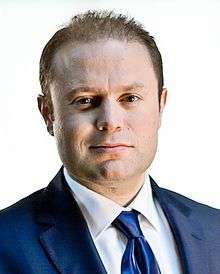 | |
| António Costa | Prime Minister | Socialist Party | 26 November 2015 | .jpg) | |
| Peter Pellegrini | Prime Minister | Direction – Social Democracy | 22 March 2018 | 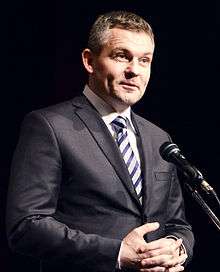 | |
| Pedro Sánchez | Prime Minister | Spanish Socialist Workers' Party | 2 June 2018 |  | |
| Stefan Löfven | Prime Minister | Social Democratic Party | 3 October 2014 |  |
Although the prime minister of Romania, Mihai Tudose, is also a member of the PES (and his Social Democratic Party is a PES member party), Romania instead sends its president to the European Council.
European Council and Council of Ministers
.png)
Does not account for coalitions. Key to colours is as follows;
Party-alignment at the European Council is often loose, but has been the basis of some intergovernmental cooperation. At present five countries are led by a PES-affiliated leader, who represents that state at the European Council: Spain (Pedro Sánchez), Portugal (Antonio Costa), Malta (Joseph Muscat), Slovakia (Peter Pellegrini), and Sweden (Stefan Löfven).
The makeup of national delegations to the Council of Ministers is at some times subject to coalitions: for the above governments led by a PES party, that party may not be present in all Council configurations; in other governments led by non-PES parties a PES minister may be its representative for certain portfolios. PES is in coalition in a further seven countries: Estonia, France, Germany, Lithuania, Luxembourg, Romania and Slovenia.
Overview
Parliamentary Assembly of the Council of Europe
Committee of the Regions
PES has 122 members in the Committee of the Regions as of 2014.[19]
References
- ↑ Nordsieck, Wolfram (2015). "European Union". Parties and Elections in Europe. Archived from the original on 2017-06-08. Retrieved 2018-09-22.
- 1 2 Richard Dunphy (2004). Contesting Capitalism?: Left Parties and European Integration. Manchester University Press. p. 103. ISBN 978-0-7190-6804-1.
- 1 2 "Member parties of the Progressive Alliance". 2017-02-01. Retrieved 2017-08-08.
- 1 2 "Member parties of Socialist International". 2017-02-01. Retrieved 2017-08-08.
- ↑ Robert Thomson (2011). Resolving Controversy in the European Union: Legislative Decision-Making Before and After Enlargement. Cambridge University Press. p. 14. ISBN 978-1-139-50517-8. Retrieved 9 August 2013.
- ↑ "Member parties of the PES". 2017-02-01. Retrieved 2017-08-08.
- ↑ "Il PSE "omaggia "il PD cambiando ufficialmente nome: PSE - Socialists&Democrats" (in Italian). 2014-03-02. Retrieved 2016-09-20.
- ↑ "Northern European Social Democracy and European Integration, 1960-1972. Moving towards a New Consensus?". Academia.edu. Retrieved 23 May 2013.
- 1 2 3 "History". Socialist Group website. Archived from the original on 1 November 2007. Retrieved 11 November 2007.
- ↑ Skrzypek, Ania (2013). "Europe, Our Common Future" Celebrating 20 years of the Party of European Socialists (PDF). Belgium: FEPS – Foundation for European Progressive Studies. ISBN 978-3-85464-037-0.
- ↑ "Together for the Europe we need!". Zita Gurmai, President of PES Women. 26 July 2012. Archived from the original on 19 August 2012. Retrieved 8 August 2012.
- ↑ "Ethics in politics : For strong moral conduct through a strong moral code" (PDF). PES Presidency declaration. 14 April 2011. Archived from the original (PDF) on 8 August 2011. Retrieved 8 August 2012.
- ↑ "About the PES?". PES website. Retrieved 14 September 2016.
- 1 2 3 4 "How does PES work?". PES website. Archived from the original on 30 October 2007. Retrieved 7 November 2007.
- ↑ "Former PES Presidents". PES website. Archived from the original on 9 October 2007. Retrieved 21 January 2008.
- ↑ "A New Direction for Progressive Societies. Resolution N. 2 A new way forward. Adopted by the 8th PES Congress" (PDF). PES. 8 December 2009. Retrieved 17 October 2010.
- ↑ "PES Manifesto Towards a New Europe. Adopted by Election Congress 2014 in Rome" (PDF). PES. 1 March 2014. Retrieved 1 March 2014.
- ↑ Mahony, Honor (7 May 2007). "Brussels struggles with communication policy". EU Observer. Retrieved 12 May 2007.
- ↑ "PES Group Members". Archived from the original on 6 January 2013. Retrieved 13 January 2015.
External links
| Wikimedia Commons has media related to Party of European Socialists. |
- Party of European Socialists, official website
- Parliamentary Group of the Party of European Socialists, official website
- European Youth Guarantee campaign, official website
- PES Group in the Committee of the Regions, official website
